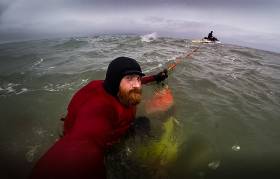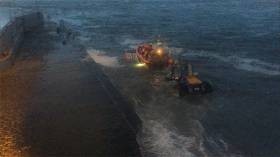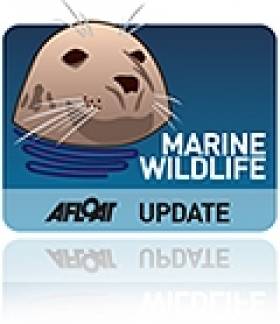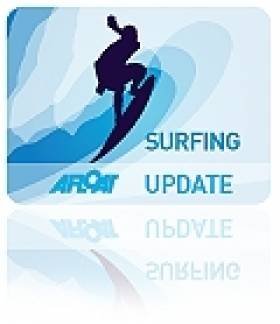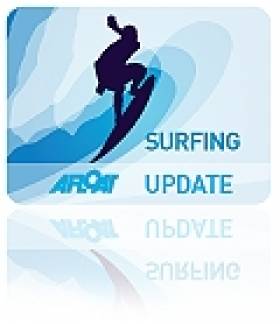Displaying items by tag: surfer
Big Wave Surfer Al Mennie Uses His Experiences in Life Threatening Seas to Show How He Manages Anxiety & Fear in All walks of Life
You Will Turn the Tide! That is the message from Northern Ireland's Big Wave Surfer Al Mennie in his new book 'Overcome or Succumb'.
Al Mennie is best known for tackling gigantic waves in the wildest of weather and in doing so facing all sorts of anxieties and fears head on.
Anxiety and Fear effect millions of people to varying degrees across the world and appear to be a growing issue despite lots of research and resources available in how to handle them. Al believes his experience surfing some of the biggest waves on the planet has lead him to understand anxiety, fear and panic and allowed him to handle lots of everyday situations with a similar approach.
“I personally experience fears and anxieties like everyone else. What I learned skills over the past 28 years of putting myself in gradually bigger and bigger seas in the pursuit of gigantic waves has led me to understand myself, how fear and anxiety affect me and how to continue forward regardless”
“I don’t believe I have the ultimate answer, I don’t believe anyone does for that matter and the reason for that is that everyone, every situation, everything is different. I don't see Fear and Anxiety as text book issues that can be dealt with in the same way by everyone. I see Fear and Anxiety as personal feelings, not universal. I believe that there are some specific principles which can help, and I believe that once something is faced that it becomes easier to face the next thing and so on. Life can become better because facing fears leads to experiences and opportunities”
"I hope something from my experience is of help to someone else"
In the book Overcome or Succumb, Al tells of various situations of how he felt anxiety for days before and fear in the moment whilst facing 100-foot waves, a burglar and even the dentist chair after avoiding it for 11 years! He tells how he has learned to handle those feelings, accept them and carry on.
The book Overcome or Succumb is available here
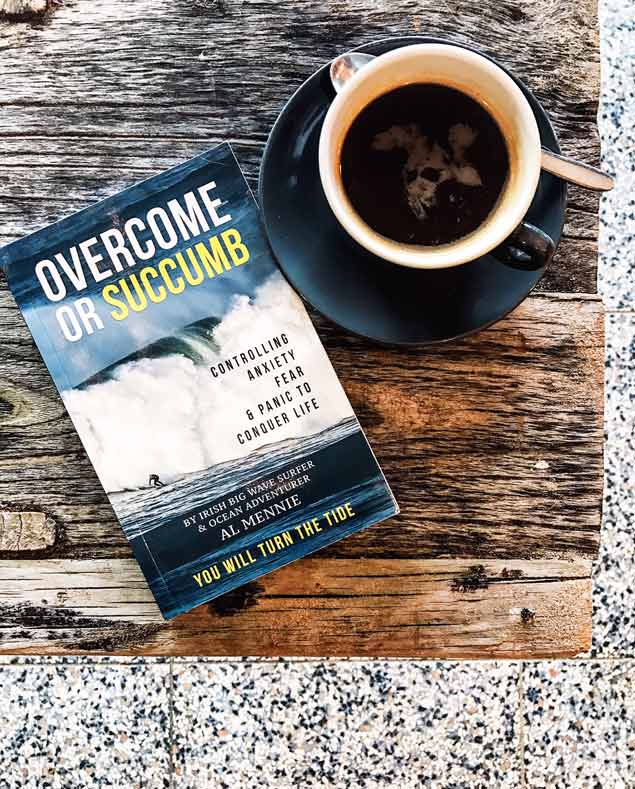
What is in the book Overcome or Succumb?
All sorts of things from stories of Anxiety, Fear and Panic I felt in the lead up to and during some of the biggest surf ever ridden and how it was handled and managed. I give real accounts of how I felt and how it has taught me to handle other fears and anxieties in my life including the dentist! I avoided him for 11 years until I was able to handle the fear and anxiety I associated with him since I was a teenager!
The book illustrates how learning to handle fear and anxiety can improve happiness and provide lots of opportunities in life.
Is the book Overcome or Succumb just for surfers?
No! Absolutely not! This is not a "surf book" full of cowabunga gnarly dudes! Far from it!
I learned how to handle Anxiety and Fear through my pursuit of big waves all over the world, but this book explains lots of scenarios where those skills have transferred to ordinary life. This is a book for anyone who wants to read about anxiety and fear in extreme situations and how the skills I have for managing them are applicable to my everyday life.
This book is for anyone who wants to see how I have managed anxiety and fear in extreme situations and used it to better my life by tackling life in the same way, using the same techniques learned in huge seas.
Is Al a Doctor or Medical Professional?
NO, I AM NOT! This is not a book of research or a book written by an onlooker or Scientist! This is a book full of my own experiences with anxiety and fear, it's personal to me. I have learnt a specific skill in handling anxiety and fear and I have been able to adapt and apply it to everyday life. I am fortunate to be in a position to write it down and share it for others to read. If anyone reading this or the book seeks medical expertise, then they should seek a suitably qualified practitioner. This is a book of my experience with some of the most debilitating feelings and emotions known to human beings and how I have been lucky enough to learn how to handle them. It is not a book of medical or scientific advice. I cannot advise an individual on anything in life as everyone’s situation is different, we all have different skills, different hurdles and it would be naive to think anyone, including me, has the ultimate answer. I share my experiences in the hope that others may find a way in themselves to also face their fears and handle their anxieties based on the knowledge that others have made it to the surface.
Are you actually scared of the Dentist? Like seriously?
Yes, I am! I had a traumatic experience as a teenager which unknowingly lead to extreme fear and anxiety. I didn't go back for 11 years and I had the most horrific experience when I did! It's ok now though, I got over it!
What's it like to be sitting on a surfboard way out at sea trying to catch a big wave?
It's very intimidating. I'm a big guy at 6'5" and the vastness of the ocean and the volume of water moving forming giant waves makes me feel small and insignificant. Putting myself in the position I need to be in order to catch one of these huge, dark, menacing walls of water as it's coming for me is a major psychological battle. My mind is terrified, but my heart is telling me to go for it. It's a battle of the heart and mind in a very dangerous environment. I've spent many years doing this not just in Ireland, but all over the world so I have had a lot of exposure to fear and anxiety beforehand when I'm worried about what the storm will bring, worried about my team, what happens to my family if something happens to me?
There are so many things that go through my mind and heart before I even attempt to ride a big wave that involve anxiety and or fear. Hence why I have become proficient at recognising fear and anxiety in everyday life and become good at handling it in various ways.
Do you get anxious and scared?
Yes, I do! Everyone does! It's happened to me so many times in the pursuit of riding huge waves that I've learned how to deal with it. If I didn't learn how to deal with it I wouldn't be able to surf all the giant waves I've wanted to, and I would have to accept something much less than what I wanted for myself.
I am not void of fear and anxiety, far from it, it is bubbling inside me a lot, but I am aware of it and I do not let it stop me going after what I want, well most of the time!
Why did you write this book?
I wrote this book for a few reasons. One of which being that surfing is a relatively selfish pursuit. It doesn’t really do anything to help anyone but the surfer. I know I have lots of knowledge and experience honed from in particular big seas which let’s be honest, isn't of any use to anyone but me. I have always wondered how I could use that knowledge to help others in some way. A few years ago, after a girl drowned at a local beach, I attempted to launch a campaign called "Ask a Surfer" at the time to try and raise awareness of beach and water hazards for tourists to try and prevent fatalities. Despite help from MP's I struggled to get it rolling. Since then I realised that passing on knowledge about things I have dealt with in my own life may be one way I can help. I also hope in the future to be able to work with children and adults that have lost a parent as I believe the impact caused by that is immense and I know what it is like to go through and I would like to in some way help those going through that. However, I haven’t worked that one out yet, but someday I will. For now, its fear!
Bundoran RNLI Lifeboat Called To Surfers in Difficulty
The volunteer crew of Bundoran RNLI lifeboat were requested to launch yesterday evening (Saturday 9th April) to reports of surfers in difficulty off Tullaghan in County Leitrim. The 999 call was made by a member of the public who noticed the surfers struggling to make their way back to shore.
Within minutes the lifeboat launched in challenging conditions and made its way to the scene where the Sligo based Rescue 118 helicopter, who were returning from another incident, had already lifted one of the surfers out of the water. The other surfer was then lifted from the water by the lifeboat. The helicopter landed and handed over the surfer they had lifted to RNLI shore crew. Neither surfer needed medical assistance.
On their return to the the lifeboat station helm Brian Gillespie said 'the surfers had luck on their side with the helicopter passing and our boat being able to launch in such challenging conditions. The outcome was positive on this occasion and we are thankful we were able to get to the surfers on time. We would like to remind anyone who sees anyone in trouble on the coast to ring 999 or 112 and ask for the Coast Guard.
Surfer Attacked By Shark - And Lives to Tell the Tale
#MARINE WILDLIFE - A Sligo-based surfer has relived the moment when he was attacked by a shark in his native New Zealand.
As the Otago Daily Times reports, 42-year-old Peter Garrett was surfing off Taranaki on North Island on Tuesday when the shark mauled him, leaving 10 bloody wounds - each about 2cm deep - with its razor-sharp teeth.
"He was bleeding quite a bit," said James Bruce, one of two vets surfing in the area who came to his aid. "You could tell from the teeth marks it could've been more serious."
Speaking to the Irish Independent from New Zealand, Garrett said he was knee-boarding at the time when he felt a bump to the board and a sudden sharp pain in his leg.
"I looked down and there was a shark on my leg and I sort of yelled obscenities at it... But it came back and I kicked at it with my flippers."
New Zealand has a relatively high incidence of unprovoked shark attacks, with some 44 on record since the mid 19th century - compared to 39 for the whole of Europe.
The Irish Independent has more on the story, including photos, HERE.
Cork Surfers Brave More Than The Cold!
There'a always a sliver lining around our coast. Whats a problem for some can be turned to advantage for others. A reef that sailors avoid during racing on coastal courses from Royal Cork presented the perfect setting for some Cork Harbour surfers at the weekend writes Brian Carlin.
A local hazard, the reef is situated approximately a mile west of the entrance to Cork Harbour, dangerous at high tide as most of the reef is immersed. SCROLL DOWN FOR IMAGES.
Surfers took advantage of the direct southerly swell, the surfers, Mark Barry, John Powell and Brian Hartnett, explained only in these conditions is the reef surfable. The trio enjoyed the best of the January sunshine and gave the shoreline spectators a show worth watching. Photos by Brian Carlin.


























